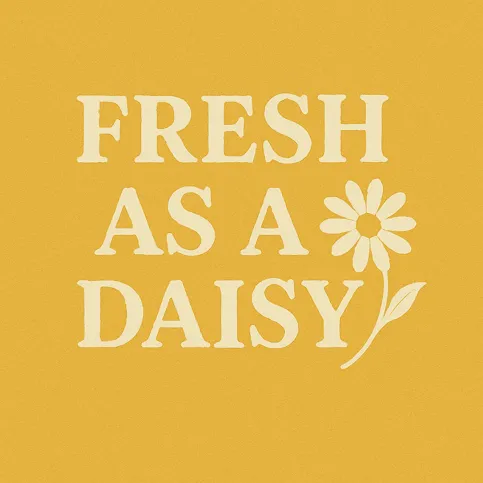What is the meaning of the phrase “fresh as a daisy”?
Fully rested, not at all tired, full of energy and enthusiasm, energetic and lively.
What is the origin of the phrase “fresh as a daisy”?
The first known recorded use of the English simile and metaphor “fresh as a daisy” dates back to 1833/1834, when it was written in the works of Captain Frederick Marryat. He wrote “Rouse a bit, wash your face with old Thames water, and in half-an-hour you’ll be as fresh as a daisy.” That said however, it is not known if he was the first person to ever coin the term. Soon after, the phrase became commonly found in Victorian moral tales, romantic literature, and children’s rhymes, where daisies appeared as part of rural iconography.
The phrase is thought to refer to how many daisies close their petals at night and open up again when daylight comes, giving them a reputation for always being fresh. Daisies also have a bright visual simplicity that puts one in mind of innocence, purity and natural vitality.
In the Victorian and Edwardian fiction of 19th-century British literature, characters are often described as “fresh as a daisy” after rising from bed, stepping into a garden, or emerging from illness. For example, in an 1885 serialized novel, a character in The Gentlewoman’s Journal is described: “She rose, fresh as a daisy, her cheeks flushed with morning air and her eyes full of brightness.”
By the 20th century, the phrase gained broader traction, appearing in both British and American literature. For example, in P.G. Wodehouse’s comic stories, characters often used the expression in a light-hearted or ironic way. Such as in the line: “Bertie was up, dressed, and fresh as a daisy, quite forgetting the escapades of the previous evening.” This time, the tone emphasises cheerful resilience rather than the feminine purity and natural beauty it typically represented in the Victorian era.
How do you use the phrase “fresh as a daisy”?
The idiom “fresh as a daisy” was and is most often used to describe a person’s revived physical or emotional condition after sleep or illness, or some form of break. Other times, it can be used by someone to depict their enthusiasm for a task or project they are about to start on.
However, it should be noted that people often use the phrase “fresh as a daisy” ironically as sarcasm, for example when someone is clearly not fresh but is pretending to be, or is being complimented despite obvious exhaustion.
This could occur in the context of parenting humour, e.g. “Three hours of sleep and I’m feeling fresh as a daisy!”, or in workplace banter, e.g. “Back from vacation and fresh as a daisy, I see.”
There’s also an example in the American sitcom Friends (1990s). After being awake for 24 hours, Monica says “Don’t I look fresh as a daisy?” to which Chandler retorts: “If the daisy died in a microwave.” This usage of the phrase illustrates its evolution into hyperbole or mockery, particularly in modern comedy.
What are some alternative ways of saying “fresh as a daisy”?
There are many similar and alternative phrases that are synonymous with the phrase “fresh as a daisy”. Here follows some examples:
- bright-eyed and bushy-tailed
- full of vim and vigour
- feeling like a new person
- feeling ready and raring to go
- full of energy and enthusiasm
- well-rested and full of energy
- fresh as the summer rain
- full of beans
- alive and kicking
- like a new man
What are some notable uses of the phrase “fresh as a daisy”?
Use in literature
In the Miss Marple novel titled The Body in the Library, written by Agatha Christie and published in 1942, a younger woman is described as “fresh as a daisy” by an older, skeptical character, highlighting a generational contrast.
In Sophie Kinsella’s romantic comedy, Confessions of a Shopaholic, published in 2000, the protagonist, Becky Bloomwood, often refers to herself with phrases like “fresh as a daisy” in contexts where she clearly is not—playing into the genre’s love of self-deprecating humor.
The phrase has also appeared in children’s literature. For instance, in Lola Rose, published in 2003, it is used to praise a student’s punctuality and appearance.
In Terry Pratchett’s Discworld series, idioms from the real world are often used satirically. For example, in the book Reaper Man, the phrase is used by a character who doesn’t fully understand human idioms, drawing attention to its absurd literalism. He says “Fresh as a daisy? What kind of metaphor is that? Flowers rot, you know.”
Use in film
In 1930s and 1940s cinema, particularly in romantic comedies and musicals, heroines are described or shown as being “fresh as a daisy”. For example, in the 1940 film The Shop Around the Corner, the phrase is used in banter between characters regarding first impressions and physical appearance.
Musical References
Though not as prevalent in song titles, the imagery behind “fresh as a daisy” appears in folk, country, and pop lyrics, often evoking the themes of springtime, renewal, and love’s innocence.

